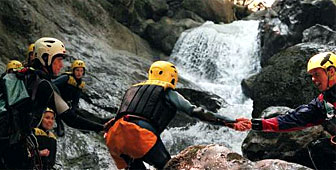
Canyoning operators try to regain footing

Swiss firms that offer extreme sport activities have been slow to respond to pressure for improved safety standards.
The 1999 canyoning accident in the Saxet Valley near Interlaken sent shock waves through Switzerland and set off heated debate at all political levels. There were calls in some circles for an outright ban on extreme sports. Environmentalists, who supported the ban, said thrill seekers had no business entering canyons in the first place.
Many Swiss were surprised to learn that canyoning guides did not require licences or the same rigorous training as mountain guides. This led to calls for the introduction of laws governing extreme sport activities.
But in the immediate aftermath, little was done. Canyoning resumed the following year on the river in the Saxet Valley.
Other fatalities
And while greater care is now being taken during canyoning trips in the Saxet Valley, there have been other fatalities involving extreme sports.
An American died in the summer of 2000 because the staff of Adventure World – the company involved in the canyoning accident — attached a rope that was too long to his leg.
This year, two teenagers under adult and allegedly professional supervision died in separate river-rafting incidents. Experts like Urs Baumgartner of the Swiss Federal Sports Office say the accidents could have been prevented.
“The guides did not take proper account of the conditions, such as the water levels,” Baumgartner told swissinfo. “If a guide calls off a trip, then he doesn’t make any money. It was the same case in Interlaken.”
Voluntary guidelines
Baumgartner’s office introduced voluntary canyoning guidelines last year. They spell out the qualifications required by guides, the safety procedures that organisers of expeditions must follow and the rights of paying customers.
The largest companies offering extreme activities have welcomed the guidelines, as well as a new label “Safety in Adventure” which is being granted to companies who follow the guidelines and meet other stringent criteria.
The label is the brainchild of the Bernese cantonal government and is being promoted by the Swiss tourist industry, so that, in two or three years, it is hoped that only companies with the seal of approval will have the support necessary to reach a wide enough customer base.
And, according to Baumgartner, there is a move among insurers to sell policies only to operators who can prove they meet the standards.
Since the Interlaken accident, business in extreme sports is down about 50 per cent and operators who have survived are feeling the pinch to make the costly investments in order to meet the new standards.
But Daniel Chézière, owner of Switzerland’s largest operator, Swissraft, and co-founder of the Swiss Trend Sport Association, says it is the only way to win back important Swiss and German customers turned off by the bad publicity following the Interlaken incident.
Demand high in Interlaken
Paradoxically, one of the few places where the demand for extreme sports is still high is in Interlaken, where, according to the head of marketing at Interlaken Tourism, Benno Küng, “canyoning is booming”.
The young English-speaking backpackers who crowd into Interlaken every summer either haven’t heard of the accident, or shrug off the potential risks.
Küng and Chézière agree that the voluntary guidelines and label should be enough to enable the industry to regulate itself.
For its part, the Swiss Mountain Guide Association (many certified mountain guides also lead canyoning expeditions) says the guidelines represent a big step forward, but believe only laws can put cowboy operators out of business.
The Swiss parliament has just started discussing a proposed law, supported by the association. The author of the bill is Jean-Michel Cina, a member of the House of Representatives.
“Just imagine two operators located close to each other,” Cina told swissinfo. “The one follows the voluntary guidelines and the other doesn’t. The one that doesn’t can offer trips at a better price and will therefore get customers.”
Cina says it will take at least two to three years before the bill is made into law, if it is able to overcome stiff opposition.
by Dale Bechtel

In compliance with the JTI standards
More: SWI swissinfo.ch certified by the Journalism Trust Initiative




























You can find an overview of ongoing debates with our journalists here . Please join us!
If you want to start a conversation about a topic raised in this article or want to report factual errors, email us at english@swissinfo.ch.